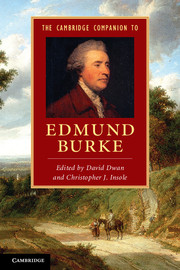Book contents
- Frontmatter
- Contents
- Contributors
- Acknowledgements
- Method of Citation
- Chronology
- Introduction Philosophy in Action
- 1 Burke’s Life
- 2 Burke, Enlightenment and Romanticism
- 3 Burke as Rhetorician and Orator
- 4 Burke’s Aesthetic Psychology
- 5 Burke on Law and Legal Theory
- 6 Burke on Political Economy
- 7 Burke and Religion
- 8 Burke and the Constitution
- 9 Burke and the Natural Law
- 10 Burke and Utility
- 11 Burke and the Ends of Empire
- 12 Burke and the American Crisis
- 13 Burke on India
- 14 Burke and Ireland
- 15 Reflections on the Revolution in France
- 16 Burke’s Counter-Revolutionary Writings
- 17 Burke in the United States
- Further Reading
- Index
- References
10 - Burke and Utility
Published online by Cambridge University Press: 05 December 2012
- Frontmatter
- Contents
- Contributors
- Acknowledgements
- Method of Citation
- Chronology
- Introduction Philosophy in Action
- 1 Burke’s Life
- 2 Burke, Enlightenment and Romanticism
- 3 Burke as Rhetorician and Orator
- 4 Burke’s Aesthetic Psychology
- 5 Burke on Law and Legal Theory
- 6 Burke on Political Economy
- 7 Burke and Religion
- 8 Burke and the Constitution
- 9 Burke and the Natural Law
- 10 Burke and Utility
- 11 Burke and the Ends of Empire
- 12 Burke and the American Crisis
- 13 Burke on India
- 14 Burke and Ireland
- 15 Reflections on the Revolution in France
- 16 Burke’s Counter-Revolutionary Writings
- 17 Burke in the United States
- Further Reading
- Index
- References
Summary
In an early fragment, Burke drafted ‘A Plan for Arguing’ in which he listed key strategies of debate: arguments from ‘justice’ were of fundamental importance, but crucial too were appeals to ‘interest’ and ‘convenience’ (N, 46–7). These would remain important rhetorical principles throughout Burke’s career as a statesman, but it is difficult to determine how justice, interest, and convenience exactly relate – or, indeed, if their relation is systematic or largely arbitrary – in his moral universe. This issue is central to an understanding of ‘utility’ – a key, but much disputed theme, in Burke’s political thought. He repeatedly insisted that the utility of a proposal was central to deciding its merits, but it was not always clear if this utility was independent or, in fact, constitutive of its justice. In 1765 he presented ‘utility’ – alongside ‘equity’ – as one of the two pillars of law (WS, IX: 456). Fourteen years later, however, utility seemed to have become not just a necessary legal principle, but a sufficient criterion of justice for lawmakers: ‘only the utility and convenience of the community as it happens by accident to be constituted’ were, he insisted, proper grounds for legislation (WS, III: 432). Somewhere down the line justice, interest, and convenience appeared to have merged.
Partly for these reasons, Burke is often considered to be a ‘utilitarian’ thinker. Clearly, much depends here upon the meaning of the word ‘utilitarian’ (a term that seems to have been first deployed by Jeremy Bentham in a letter in 1781) and the extent to which this represents a distinctive and systematic doctrine. Some might suggest that to attribute any systematic theory to Burke is already to distort his intellectual practice. It is worth reiterating that his major political writings were triggered by specific events and were practical responses to them; they were not offered as a comprehensive system of morals – and it is often the systematic character of utilitarianism (its ‘all-comprehensiveness and consistency’, as Bentham put it) that its adherents endorse and its critics disparage.
- Type
- Chapter
- Information
- The Cambridge Companion to Edmund Burke , pp. 131 - 144Publisher: Cambridge University PressPrint publication year: 2012
References
- 2
- Cited by

